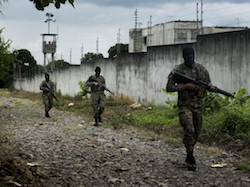Officials in El Salvador announced a new phase of “extraordinary” anti-gang measures instituted earlier this year, despite questions about the effectiveness of these policies and concerns that they may be infringing on citizens’ rights.
On August 8, Security and Justice Minister Mauricio Ramírez Landaverde appeared on the television program “Diálogo,” where he announced the government had begun a second phase of implementing special prison security measures approved by the congress in April.
“We are going to reinforce security in these centers with the adoption of a series of operational measures that seek to strengthen the activities of control and security in the centers,” Ramírez said.
The security measures aim to prevent contraband from entering the prisons, and to cut off contact between incarcerated gang members and the outside world.
In order to accomplish those objectives, the government has focused on asserting control over residential areas surrounding correctional facilities by intensifying security operations and even proposing a law that would prohibit the use of the internet in those neighborhoods.
Rodil Hernández, the director of prisons, recently told La Prensa Gráfica that people in neighborhoods located near prisons represent a bigger challenge for prison authorities than corrupt guards.
Relating a story about local residents and inmates exchanging messages through notes lobbed over prison walls, Hernández said, “There must be some complicity by the guards, but it is minimal.”
However, the news outlet also consulted a soldier tasked with guarding a prison who disagreed with Hernández’s assessment.
“The government could have 1,000 police officers and 1,000 soldiers guarding every meter outside the prisons, preventing anyone from throwing illicit objects inside,” the soldier said. “But the problem will continue because there are corrupt guards that take money in exchange for bringing in [phone] chips and cell phones.”
National Civil Police Director Howard Cotto also recently indicated that lawyers had been used as messengers for incarcerated gang members, carrying instructions for murders, extortion and other crimes from inside the prison to gang operatives on the outside.
“The lawyers didn’t just take messages to commit crimes, they also took orders and messages to move money and to increase the illicit assets” of the gang, Cotto said, explaining that the inmates trusted the attorneys more than lower-level gang members who were not aware of some of the financial dealings of more senior members.
InSight Crime Analysis
Salvadoran authorities have credited the extraordinary measures for a decline in violence over the past few months. However, it is unclear how much the government’s anti-gang crackdown has contributed to this development. An alternative explanation for the reduction in violence is the March agreement among gang leaders to order an end to killings by rank-and-file members. Moreover, recent polling shows that a majority of citizens believe the government’s policies have failed to meet their objectives.
SEE ALSO: El Salvador News and Profiles
In addition to lingering questions about the efficacy of the extraordinary measures, there are concerns that these policies may be unduly infringing on the rights and liberties of citizens. For example, efforts to block cell phone signals in the prisons in order to prevent gang members from communicating with those outside have also affected cell service for citizens in neighboring areas.
As El Salvador seeks solutions to ongoing security challenges, it will be important for lawmakers and law enforcement to take a balanced approach that respects citizens’ rights and makes use of evidence-based strategies for tackling gang violence and corruption.

